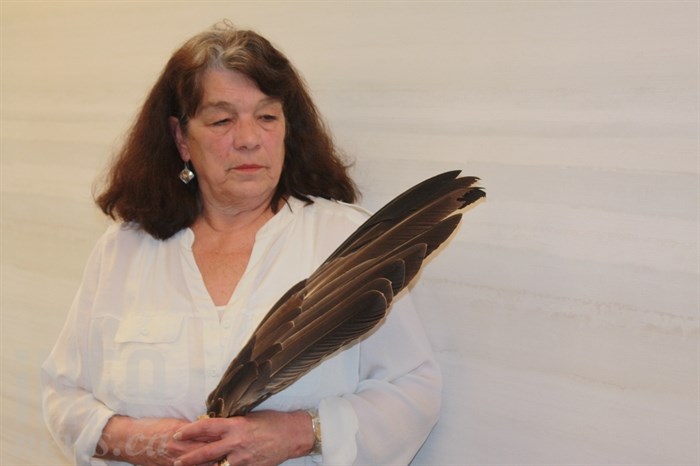
Bonnie Watts stands with her late husband Michael's eagle wing.
(SEAN MOTT / iNFOnews.ca)
June 20, 2019 - 6:00 AM
WESTBANK FIRST NATION - Bonnie Watts is taking her fight to the national level.
Two months ago, Watts gained headlines when it was reported on iNFOnews.ca that she was being evicted from her Westbank First Nation home after her husband died. Watts took her case to the B.C. Supreme Court, but they sided with Westbank First Nation. Now she's decided to voice her concerns at one of the biggest gathering of First Nations chiefs in the country.
The 2019 Assembly of First Nations Annual General Meeting will be held in Fredericton, N.B. on July 23-25. The event sees chiefs from across Canada come together to discuss issues affecting First Nations communities. Watts is bringing her eviction story to the table at the gathering, and she won't be alone.
On June 14, Watts traveled to Ontario to speak with her fellow members in the Aundeck Omni Kaning First Nation to go over her options. She said members will be joining her in Fredericton to give voice to the possible ripple effect her eviction decision could cause.
"We're going to open it right up and put it on the floor," Watts said.
READ MORE: 'I'm not a victim:' Widow evicted from Westbank First Nation vows to keep fighting
The issue at hand is more than personal for Watts; she's worried what the decision could mean for all First Nations people.
In 2016, Watts and her husband Michael, a Westbank First Nations member, moved into a property on Falcon Lane under the Allotment Lease to Own Agreement. The deal included a provision that the couple had to live at the property for five years before Michael, who was the lessee, could receive the certificate of possession.
In 2018, Michael died and left the property lease to Watts in his will. Watts, who never gave up her Ontario First Nations status, needed this will to receive the lease, since non-band members can't own land unless it's leased by a member.
Legal counsel for Westbank First Nation said that since Michael died before the five year term, it was not within his power to transfer the property lease to Watts. Watts fought this decision, but she ultimately lost, forcing her to move out of the property in April.
Watts' main concern is the precedent this decision sets for other First Nations people living in similar circumstances. She said the ripple effect could be devastating.
READ MORE: iN PERSPECTIVE: Bonnie Watts explains her eviction from WFN in her own words
"There are so many layers with it," she said. "We have to negotiate in good faith."
Watts said dozens of First Nations groups will be at the general meeting, including Westbank. She's hopeful her position will be heard and it will spark a larger discussion.
"We have to find a solution," she said.
Watts said her husband believed prudent citizenship is the best way to secure Native rights and ensure Treaty agreements are upheld.
"When you're Treaty, you're always in the game," she said. "We should be actively engaged all the time."
When asked about Watts' intention to speak at the general meeting, Westbank First Nations legal department replied in an emailed statement, "WFN manages its community property for the benefit of its members. Recently, the British Columbia Supreme Court examined and weighed all the relevant facts around Bonnie Watts’ case, and determined that Ms. Watts did not qualify to continue to hold WFN community property."
To contact a reporter for this story, email Sean Mott or call (250) 864-7494 or email the editor. You can also submit photos, videos or news tips to the newsroom and be entered to win a monthly prize draw.
We welcome your comments and opinions on our stories but play nice. We won't censor or delete comments unless they contain off-topic statements or links, unnecessary vulgarity, false facts, spam or obviously fake profiles. If you have any concerns about what you see in comments, email the editor in the link above.
News from © iNFOnews, 2019